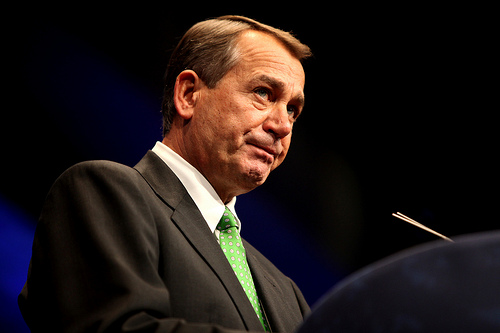In an increasingly desperate attempt to save his signature, $260 billion highway bill from the junkyard, House Speaker John Boehner (R-Ohio) pleaded with fellow Republicans to get on the bandwagon this week, even threatening to go with the (gasp!) bipartisan Senate bill instead if they didn’t get in line. Now it looks like he has given up on passing his own bill altogether.
To anyone who has been watching this saga, it comes as no surprise that Boehner’s bill is in the ditch. The original proposal, floated in late January, would have cut all designated funding for mass transit, bike paths, and safe routes to school, and tied highway building to increased oil production in the Gulf of Mexico and the Arctic National Wildlife Refuge. It also included a mandate to approve the Keystone XL oil pipeline. Not a winning combination.
What is surprising is that Boehner actually seems to have believed that he could push this junk heap through Congress — or at least the U.S. House of Representatives.
In cutting transit and bike funding, Boehner was trying to appease budget hawks and small government conservatives in his party. (He was also playing to the GOP’s suburban base.) But he still wanted a big ass bill, stretching over five years, that he could splash his name across and tell the grandkids about. Thus the effort to increase drilling: He needed a way to pay for all the road building.
But the cuts turned off Republicans from urban districts, who know that the subway isn’t just for fancy people. And the drilling provisions made the bill untouchable to all but a handful of Democrats. Boehner also attempted to get the bill passed without earmarks, and God knows, the good folks in Congress loves them some pork. (See the Bridge to Nowhere and a thousand other pet highway projects.)
In the face of widespread opposition and mass defection from his fellow House Republicans, Boehner explored several alternatives to the bill, but ultimately returned to a proposal that looked very much like the original, albeit with transit funding restored. When that went over like a lead balloon earlier this week, he threatened to just take up the compromise forged by Republicans and Democrats in the Senate.
“You don’t like that? I don’t like it either,” Boehner told his fellow Republicans in a closed-door meeting on Wednesday, the Hill reports. “It means punting on the opportunity to pass an infrastructure bill that bears our stamp.”
Then, at a news conference Thursday, he indicated that he will settle for the Senate’s version, a smaller, two-year bill with a $109 billion price tag.
The Senate bill wouldn’t exactly put solar-powered monorails in every city. In fact, lawmakers were working through a list of amendments Thursday, including one from Sen. John Hoeven (R-N.D.) that would rubber stamp the Keystone XL pipeline, one from Sen. David Vitter (R-La.) that would expand offshore oil and gas drilling, and a third that would roll back Clean Air Act rules governing pollution from industrial boilers.
Senate Majority Leader Harry Reid (D-Nev.) assured greens Thursday that he had the votes to defeat the Keystone XL amendment. President Obama has threatened to veto any bill that authorizes the pipeline.
Whatever the outcome in the Senate, it looks like Boehner will take up the proposal rather than doing nothing at all, pass the bill before the end of the month, and then go cry into his drink.
“The American people entrusted us with the majority in the House. What we do with it us up to us,” he told his fellow House members Wednesday. “We can use it to take steps together, one at a time, toward the vision we share. Or we can do nothing. We can squander the time we’ve been given …”
Perhaps he should have thought of that a month ago when he rolled his highway bill into the House. As it stands, he’ll be lucky to salvage it for parts.
UPDATE: On Thursday, the Senate voted down the amendments that would have increased off-shore oil drilling and cut back air pollution regs, and narrowly defeated the Keystone XL pipeline provision. Read our story here. The House will likely take up the Senate version of the transportation bill after the recess. Watch for it to land on Obama’s desk before the end of the month — possibly with Keystone attached once again.




